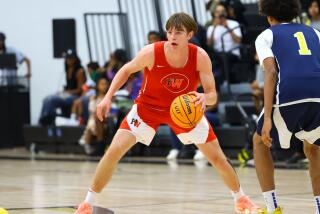Spotlight : The Clinic of Free Wheeling : Wheelchair Sports Camp Highlights Unsung Athletes
- Share via
Antoine Taylor rocks nervously in his sports wheelchair awaiting the next basketball drill. A flick of his strong wrists and he’s bobbing backward in a wheelie, then spinning on the chair’s pneumatic rubber tires.
He plucks the basketball off the ground and passes off one-handed, his large hands always pushing forward, always in control of the wheelchair. When the drill ends, Taylor returns to the baseline and rocks nervously in anticipation of the next exercise.
Opening-day drills are mere formalities for Taylor. He is one of the best athletes among the 45 youths competing this week in a junior wheelchair sports camp at Cal State Northridge. Afflicted with spina bifida since birth, the Fairfax High student moves forcefully in his Lightning Premiere wheelchair. He is more of an example than a student to others at the camp.
At 17, Taylor looks like a teen-age Mike Tyson. With his muscular torso and large biceps, he appears to be a cinch to defend his arm-wrestling title from last year’s camp. Before the first day’s lunch was over, Taylor had already dispatched his first challenger, 13-year-old Derek Westfield of Canyon Country.
On the obstacle course, however, Taylor met his match in thin, wiry Willie Hernandez of Lakewood. Hernandez circumvented the eight pylons with precision turns to defeat both Taylor and Westfield. Hernandez was no less dominant in the 100-yard dash, rolling to an easy victory.
This trio of quick, mobile athletes is an exception at the camp. They stand out in a field of handicapped youths eager to make their first basket or pop a wheelie for the first time. If most of the youths simply cultivate a better self-image during their stay, the camp will have been a success.
“We’re not out here to make wheelchair athletes out of all of them,” said Marty MacArthur, a counselor from Irvine. “If we can improve their self-confidence and make them feel better about themselves, that’s the main thing.”
At least half of the campers, including Taylor, Westfield and Hernandez, participated last year. They range from 6 to 22 in age and come from the Valley and Los Angeles for the free camp.
After four days of clinics in basketball, archery, swimming, weight training, track and field and tennis, the participants will compete for their parents in a day of closing ceremonies Saturday. There also will be a wheelchair basketball game Saturday between a camp squad and players from the Matador football team.
The camp is sponsored by CSUN in conjunction with the Department of Recreation and Parks and the National Foundation for Wheelchair Tennis.
It is unique because its eight counselors and six instructors are also handicapped. Coaches like Lou Cicciari, a Granada Hills High junior varsity basketball coach, teach and serve as role models. Cicciari had his legs amputated when he was 7 years old because of complications from a rare blood disease.
“A lot of kids come into the camp a little apprehensive and inhibited by the way it looks,” counselor Paul Manocchio of Van Nuys said. “It breaks down the barriers to see other kids in wheelchairs who look like them. This gives the kids a chance to find out that nobody really cares how you look as long as you are trying.”
Manocchio, 28, is a role model for those who want to learn how to make the most out of a physical handicap. He competed in his first Boston Marathon this year. After crashing at the beginning of the race and losing 11 minutes, Manocchio recovered to finish in two hours, 42 minutes.
“We don’t live in a disabled society,” Manocchio said. “We live in an able-bodied society where you have to feel comfortable and interact with people. If there are only disabled people out there, that’s not real-life.
“We’re trying to get across the point that these kids are not worse, just different. There are millions of things to do as long as their imagination is unlimited.”
The biggest challenge for the counselors and instructors is to adapt sports to accommodate each athlete’s needs. That may require the lowering of a basketball hoop or strapping a tennis racket to an athlete’s arm.
“Whatever ability they have, we want them to accomplish something out here,” said camp director Ralph McFarland. “Teamwork and enthusiasm are really stressed.”
Nobody has to teach teamwork to Taylor. He’s competitive, but when he’s not cruising through one of Cicciari’s basketball drills, he’s rooting for Westfield and Hernandez. Taylor competes for a National Wheelchair Basketball Assn. team in Los Angeles and has traveled nationwide with the team.
“The camp’s a lot of fun,” Taylor said. “Basketball is my favorite. I have been playing it since seventh grade.”
More to Read
Go beyond the scoreboard
Get the latest on L.A.'s teams in the daily Sports Report newsletter.
You may occasionally receive promotional content from the Los Angeles Times.










